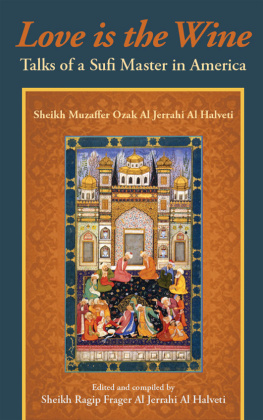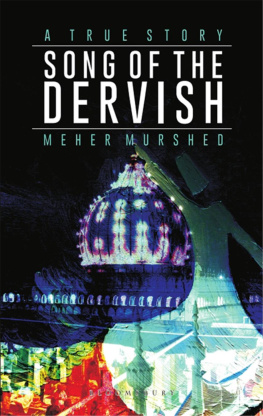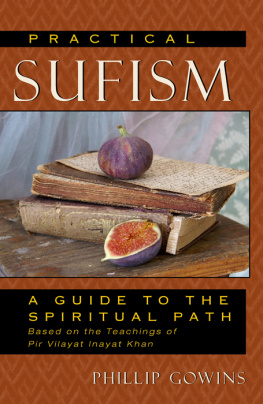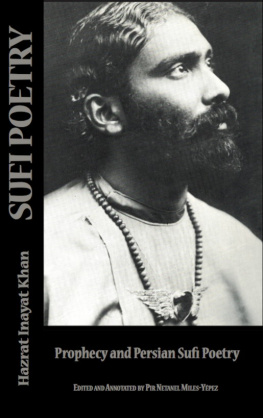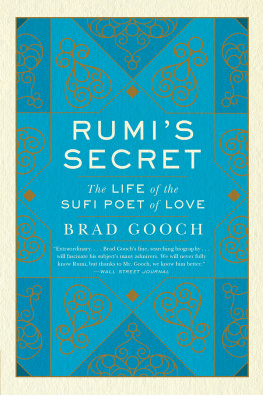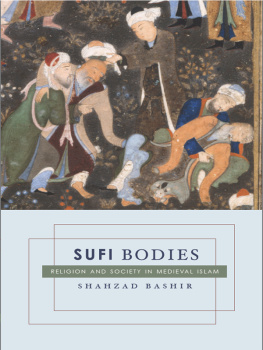Foreword
Abida Parveen
It makes me very happy to hold The Book of Nizamuddin Aulia by Mehru Jaffer, a female author whose life-long affair with reading and writing is something I admire.
For the last two decades I have been visiting Delhi almost every year. After all Delhi is darul aulia, or the home of Sufis. The city is scattered with the remains of numerous pious people. It is no secret that two kinds of people rule Delhi: one is the politician and the other is the pir. Politicians use power to influence populations while pirs practise and spread love.
While in Delhi, I never leave without praying at the dargah of Nizamuddin Aulia because of the ceaseless love that the memory of the fourteenth-century sage continues to evoke in human hearts even more than eight centuries after his death.
Every time it is the same story. I walk into the dargah filled with awareness of Nizamuddin and am drawn towards his memory by an invisible string, only to be separated from his tomb by a screen beyond which women are not allowed to venture. What can I say except that it is unfortunate that the screen of ignorance continues to keep human beings torn away from themselves even in this day and age.
The truth is that in the end there is no male or female. There is only the being, in the tradition of a tasawwufi, or Islamic mystic. I feel that it is the natural desire of both women and men to want to get intimate with what they imagine to be their source of existence.
In the eighth century, Rabia Basri, woman and Sufi, wrote that love cannot be differentiatedthat speech is born from the longing of all human beings to express that which cannot be explained. It is impossible to describe the beloved when you are one with him. It is impossible to describe the beloved when the beloved is the one in whom you exist and you are the one in whom exists the beloved.
Despite screens, despite veils and the daily creation of countless dualities, this book is proof that good things like love, compassion, devotion to becoming one and wholesome in the spiritual tradition of wahdut al-wajood, or the unity of being, are in no danger of vanishing away from life.
Above all, this book in the English language about the life and times of a fourteenth-century Sufi sage of South Asia is precious because it makes Nizamuddin speak to the whole world.
In her easy-to-read style of writing, Mehru Jaffer assures us with this biography that life cannot get worse than it is, so long as the ideas of pious human beings like Nizamuddin Aulia continue to inspire us.
New Delhi
2012
Prologue
Hazrat Sheikh Khwaja Syed Muhammad Nizamuddin Aulia, the famous Sufi saint of the Chishti order, was born in 1236. These were times both troubling and exciting. To appreciate the life of this sage it is essential to return to the tumultuous times that he grew up in.
The thirteenth century was a period of tremendous political change not only in South Asia but throughout the vast continent of Asia. The Mongolian tribes had descended in large hordes from their abode in the remote valleys of the lofty Altai Mountains to conquer most of Asia. Eventually, they marched deep into Europe as well. This was a time when long-established political orders were toppled and high cultures were crushed under the ambitious feet of emerging, new powers.
Apart from the many raids by the Mongols, there was also a conquering spree by the nomadic Turkic warrior tribes of Central Asia, who had converted to Islam. They had already wrested fertile fields from Persian rulers, including the area around Kabul. Now they eyed the even more agriculturally lush lands of the South Asian heartland. Countless wars continued to be waged over the possession of land in the Indian subcontinent.
Before the Mongols it was warriors like Mahmud Ghazni, the most famous of all the Ghaznavid rulers, who attacked South Asia seventeen times from his capital in modern-day Afghanistan. The Ghaznavid dynasty was founded in 975 CE by Turkic warriors who conquered a large part of the Punjab as well. After the annexation of the Punjab by Ghazni around 1020, the province was populated with numerous Arab and Muslim immigrants from other nations. Muhammad Ghori, of the Ilbari Turkic tribe, was the next significant Muslim ruler to invade India. Also from Ghazni, Ghori laid the foundation of Muslim rule in India. It was his slave, Qutubuddin Aibak, who founded the Slave Sultanate of Delhi. Ghori conquered Delhi in 1192. After his conquest, the stream of Muslim immigrants only swelled. A battle a day was fought over who the next custodian of the worlds wealth would be, and poets and philosophers were not to be left behind. As the soldier picked up his sword to slaughter, the Sufi stood up to confront the politics of the day with a song.
Sufis spend their life contemplating the positive aspects of life and the spirit of Islam. Sufis see beyond the zahir, or obvious appearance of reality, and the literal word of the Koran. Their attempt is to fathom the batin, or hidden meaning of the word of the creator of the world. The word sufi is thought to have been derived from the Arabic suf, or wool, or from safaa, to cleanperhaps even from sophia, the Greek word for wisdom. But it is not a name that Sufis call themselves by. Those engaged in attending to the unseen, mystical and spiritual aspects of life are called Sufis by other people. Islamic mystics see themselves as tasawwufis. They are concerned with tasawwuf, or spiritual, ecstatic meditation upon the wonder of creation. The lords of the world may amass material wealth, position and praise but the mystic seeks experiences and feelings of joy, love, and togetherness with other human beings. To be in love ad infinitum with creator, creation and all creatures great and small is the nature of a tasawwufi. A tasawwufi spends an entire lifetime nurturing the spiritual aspect of the self.
When Muslim armies burst out of the arid Arabian Desert after the founding of Islam in the seventh century in search of more fertile lands, a parallel caravan of Muslims, who stood against death and destruction and war and violence, also made their presence felt. As Muslim warriors competed with each other in conquering territory, Muslim mystics wandered around the world conquering the hearts and winning the trust of people.
The thirteenth century is remembered as the time when military strategists as well as great mystics and scholars came of age in the Islamic world.
One of the most beloved among all Muslim mystics is Jalaluddin Rumi, whose family fled Bukhara in Central Asia, which had been turned to ash by Genghis Khans marauding Mongol armies. Rumi migrated west to Konya, in the central Anatolian region of modern-day Turkey. The wondrous words of Rumis Persian poetry and his humble and humane lifestyle helped to heal many a hurt in those wounded times.


